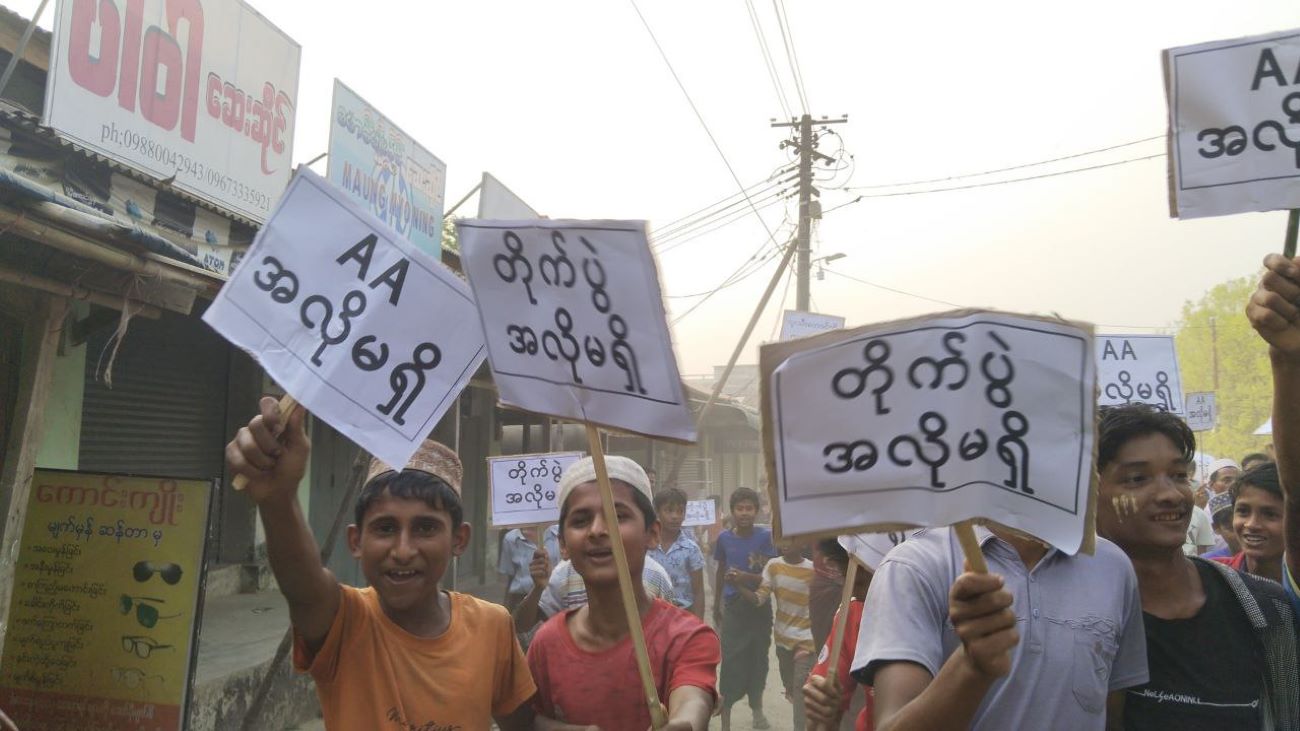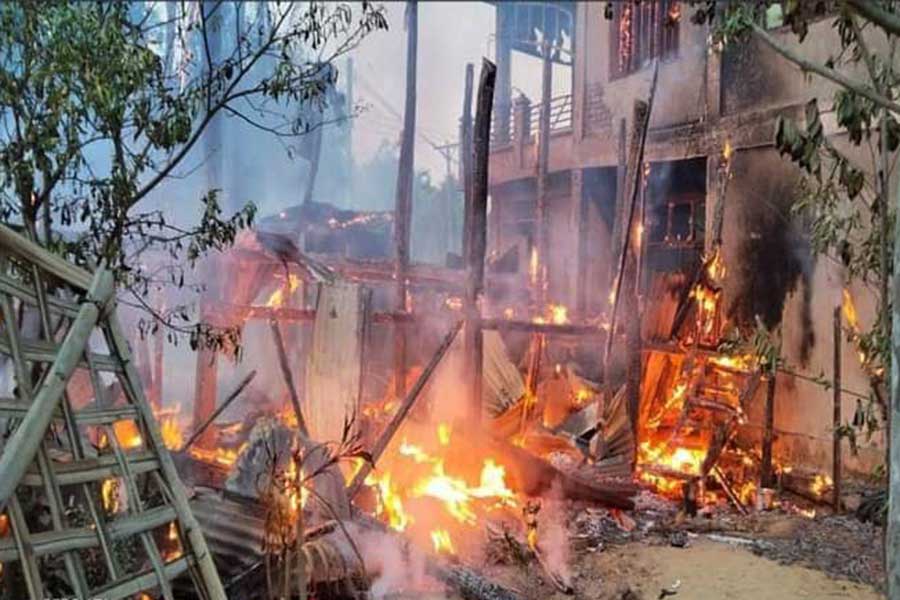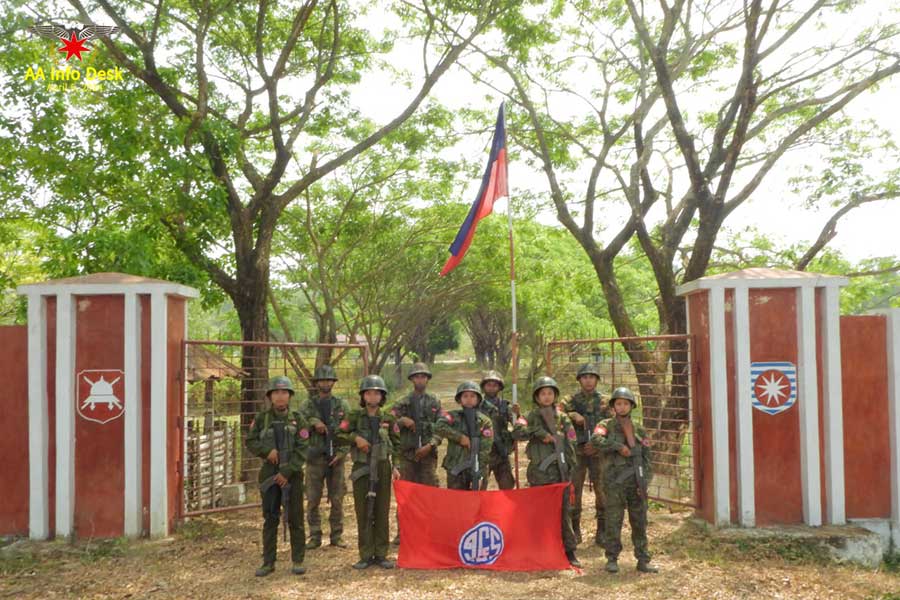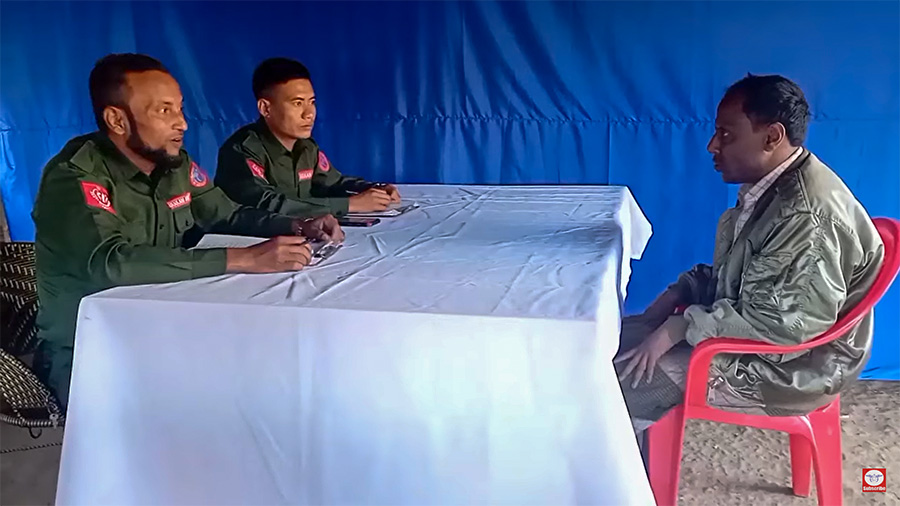- 15 mass casualty incidents from regime airstrikes reported in Arakan State since 2023
- Kyaukphyu IDPs forced to flee again amid junta airstrikes and artillery attacks
- New Diplomatic Movements Between Bangladesh’s New Government and the Arakan Public Administration
- Junta claims over 24 million ballots cast in 2025 poll, cites strong youth turnout
- ULA expands HIV prevention, healthcare services for sex workers in AA-held areas
Can Former Trauma Better Inform Response to New Devilry From Regime?
Residents say the arson attacks intended to incite racial hatred came after the regime suffered a string of military defeats in Arakan State, losing large swaths of territory in northern Arakan State over five months of fighting.
08 May 2024

Written By Myat Swe
“I am concerned that conflicts could arise between the two communities, between whom trust is difficult to build,” said Ko Hein Soe, a pseudonym for an Arakanese man from Buthidaung Town now sheltering in Yangon, who was expressing his concerns about recent incidents in Buthidaung.
He fled from Buthidaung to Yangon in March following fighting between the regime and the Arakkha Army (AA) in Buthidaung Township. He heard from a colleague about the junta’s arson attacks on houses in Buthidaung Town.
Since launching an offensive in November in Arakan State, the AA has seized Ponnagyun, Rathedaung, Pauktaw, Kyauktaw, Mrauk-U, Minbya and Myebon townships in Arakan State, and Paletwa Township in neighbouring Chin State. Fighting has also been raging in Buthidaung, Maungdaw and Ann townships as the AA tries to drive junta troops out of Arakan State entirely.
Buthidaung Township is home to the 15th Military Operations Command, with three tactical commands and 10 infantry and light infantry battalions under its command. Light Infantry Battalion Nos. 345, 342, 354, 535, 551, 552, 564 and 565 are based in Buthidaung Township, and Light Infantry Battalion Nos. 537 and 538 are based in Rathedaung Township.
Many Buthidaung residents fled the town after the AA carried out an assault on the 15th Military Operations Command. Ko Hein Soe fled on March 19. Since then, junta soldiers and members of the Arakan Rohingya Salvation Army (ARSA) and Arakan Rohingya Army (ARA) trained and armed by the regime have looted the houses of non-Muslim residents of the town for some 20 days, according to sources in Buthidaung.
After the valuables were plundered from the houses, junta soldiers and members of ARSA and ARA began torching wards in Buthidaung Town.
“Buthidaung was not destroyed by fighting. It was a deliberate arson attack. The regime wants to drive a wedge between Arakanese and Muslim communities,” said Ko Hein Soe.
Situated in northern Arakan State, Buthidaung Township is mainly populated by Arakanese and Muslim people, and Khami, Daingnet (Thetkama) and Mro tribes. Buthidaung Town is made up of seven wards. The township is religiously diverse, with residents taking faith in four major religions. With its diversity comes an added layer of religious sensitivities.

Thousands of houses belonging to non-Muslim residents have been torched in the junta’s arson attacks. Houses in ward Nos. 3, 4, 5, 6 and 7 were destroyed. But ward Nos. 1 and 2, the Muslim neighbourhood, remained intact.
“Only ward Nos. 1 and 2 were intact. The regime thinks that Arakanese people would hate Muslims when they found that their houses were destroyed and Muslims’ houses were intact,” said a woman who fled Buthidaung Town.
On March 20, the regime orchestrated a Muslim protest against the AA in Buthidaung. Hundreds of Muslims took to the streets, holding banners reading “We don’t want AA”, “We don’t want fighting” and “Let’s protect Buthidaung Town.” Junta soldiers and former lawmakers of the military’s proxy Union Solidarity and Development Party (USDP) coerced Muslims into joining the protests, said a young Muslim man.
“Muslims are facing serious hardships in townships controlled by the regime. They are persecuted if they refuse to do what they are told. The regime is exploiting Muslims,” he said.
The regime and ARSA, ARA and RSO are working hand in glove to torch houses in Buthidaung Town, said local Muslim communities.
“The regime and terror organisations torched houses in the town. Local Muslim residents were also forcibly taken to torch houses. And the regime spread propaganda that local Muslims carried out arson attacks. This would lead to conflicts between the two communities. I am concerned that racial tensions would resurface,” said a Muslim faith leader who asked for anonymity.
Residents say the arson attacks intended to incite racial hatred came after the regime suffered a string of military defeats in Arakan State, losing large swaths of territory in northern Arakan State over five months of fighting.

The AA prepared special operations to seize Buthidaung and Maungdaw townships, which are major Muslim settlements in Arakan State, said sources close to the AA.
“The AA’s attempt to seize Buthidaung and Maungdaw is not as easy as the occupation of other townships in Arakan State. These townships are very sensitive in terms of religion and ethnicity, so it is also an area that AA must attack with special care,” a military analyst in Arakan State said.
The Arakkha Army (AA) seized the Buthidaung-based No. 15 Military Operations Command, the military’s Light Infantry Battalion Nos. 552 and 564 in March and Nos. 551 and 565 on May 3, as well as a key border guard force outpost in Maungdaw.
The AA released a video clip on May 4 after it seized the Buthidaung-based No. 15 Military Operations Command. Among the junta soldiers who surrendered to the AA were the Deputy Commander of the No. 15 Military Operations Command, family members of the junta soldiers and Muslims who were forcibly recruited as militiamen.
As the losses of towns and troops increased, the regime approached the Muslims they had once massacred in Arakan State, forced them to join the military according to their procedures, and began to recruit soldiers.
On the other hand, the regime enacted a conscription law on February 10, revealing how it is losing the war in the country. According to Muslim youths, the conscription law is to recruit only Muslims from Arakan State as soldiers.
“Regime officials forced local people in Muslim villages to attend basic military training. Muslims were told that they would have action taken against them if they evaded the military service law,” said a family member of a Muslim man who was forcibly conscripted.
The regime has forcibly recruited more than 1,000 Muslims in Sittwe. Many were sent straight to the front line after two weeks of basic military training.
The junta also recruited Muslim youths from Buthidaung and Maungdaw townships, gave them military training to guard military camps, and sent them to the front lines, according to local Muslims.
All told, from the townships of Sittwe, Kyaukphyu, Buthidaung and Maungdaw under its control, the regime has forcibly recruited nearly 5,000, according to Muslim activists.
“As far as we know, the regime forced Muslim families to provide one man each to serve in the military. The regime forcibly took Muslims for military training. They were armed and sent to the front line, and are also used as human shields. At least 50 Muslim youths were killed during clashes with the AA,” said Nay San Lwin, co-founder of the Free Rohingya Coalition.
In Buthidaung and Maungdaw townships, the regime is not only using Muslim conscripts but also cooperating with ARSA, ARA and RSO to fight the AA. Arakanese politicians say these actions are creating further tensions between Arakanese and Muslims.
“The Muslim population in those areas is very large, so the regime used the last resort. The regime has chosen a path that is difficult to reverse. It is also part of the regime’s efforts to create ethnic and religious conflict between Muslims and Arakanese people,” said a political analyst in Arakan State.
Due to the ethnic conflict that occurred in Arakan State in 2012, there have been underlying tensions between Arakanese and Muslims for more than a decade. As a result of the conflict, Many Arakanese and Muslims were displaced from their homes and many houses were burned down.
In 2017, the conflict between Arakanese and Muslims in Buthidaung, Rathedaung and Maungdaw townships resulted in the burning and brutal massacre of Muslim villages, with more than 600,000 Muslims fleeing to Bangladesh due to the military’s clearance operations.
Relations between Arakanese and Muslim communities, which had been strained for 10 years, became more comfortable when the United League of Arakan/Arakkha Army (ULA/AA) took over administrative and judicial functions. Muslim people are also informed to participate in the judicial aspects that the ULA/AA is implementing.
“In 2012 and 2017, there were ethnic and religious conflicts between Muslims and Arakanese, and there was tension between the two communities. For 10 years no one had been able to reconcile these tensions, but AA has. At a time when relations between the two are improving, we do not want issues that will cause ethnic conflict,” said U Khin Maung Win, a Muslim cleric.

The ULA/AA hosted friendly football matches between Arakanese and Muslims and included Muslims in Arakanese traditional wrestling events in 2021 and 2022.
U Khin Maung Win said AA gave equal places and awards to Buddhist Arakanese people and Muslim clerics during the competition, and the hostility between Muslims and Arakanese also decreased. The military regime has perceived a good relationship between Arakanese and Muslims due to the AA’s actions.
The military regime is worried about the possibility of a revolution in Arakan State by an organising of ethnic and religious groups, and is creating a conflict between the two ethnic groups.
“Some Muslims have faith in AA. I think that the military regime is preventing AA from doing its reconstruction work. If Arakan State had come under the control of AA without the military regime, the military regime would have definitely destabilised Arakan State. We need to be aware of the tricks of the military regime,” he added.








.jpg)











